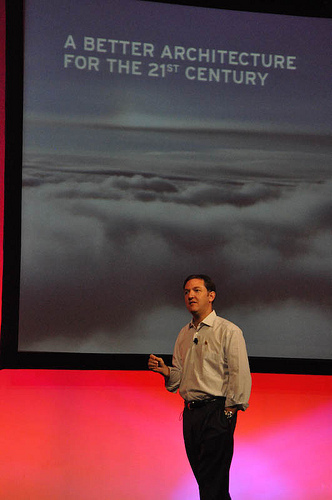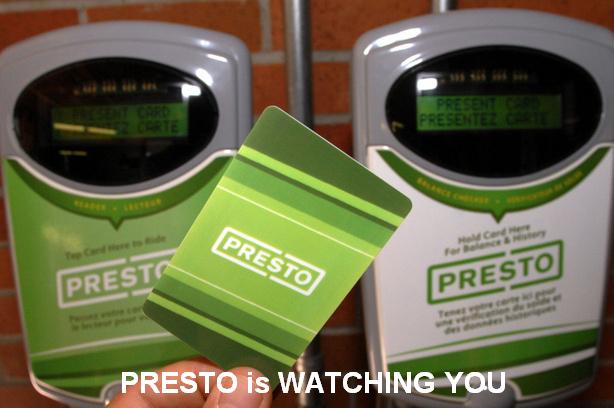06.13.12
Posted in GNU/Linux, Microsoft, Red Hat at 9:51 am by Dr. Roy Schestowitz
UEFI? Et tu?

Credit: Red Hat @ Flickr
Summary: Red Hat was not open about its decision to collaborate with Microsoft and consequently it upset many FOSS proponents, choosing to ignore their rationale
Red Hat’s and Fedora’s UEFI decision was a bad one because it does not improve security. A Fedora member seems to suggest that it’s a matter of convenience versus freedom and principles, which makes a poor excuse. To quote:
A big flame does not end suddenly, it continues with echoes and as echoes go further away, the more ridiculous they get. You can learn, for example, why do Fedora needs signed binaries for UEFI with Secure Boot: because is too hard for users to enter BIOS and change a setting there.
What about other distributions of GNU/Linux? Red Hat’s action legitimises Microsoft’s anti-competitive tactics and leaves all but Red Hat uncovered. Fedora members who are Red Hat employees complain about this piece for merely daring not to drink Red hat’s Kool-Aid (link to Google spyware, aka “Plus”, omitted). To quote Noyes:
Microsoft Loves Linux – as Long as It’s Not Red Hat
[...]
However, there’s one major Linux player that’s sort of getting left out of the lovefest. It’s enterprise Linux leader Red Hat (NYSE: RHT) and its Red Hat Enterprise Linux (RHEL), which has to sit by while other distributions, including RHEL community clone CentOS and market competitors SUSE and Ubuntu, get first-class treatment in Microsoft’s Azure cloud.
This wouldn’t be the first time we’ve seen Microsoft look to the “other” Linux distributions as leverage against Red Hat. Though some may be critical of Microsoft for its apparent selective Linux approach, the bottom line is that Redmond is among the broadest supporters of Linux in the industry today. HP (NYSE: HPQ) has historically been among the most aggressive, backing unpaid Linux distributions such as CentOS, Debian and Ubuntu — which is also a paid Linux option with support from Canonical.
Noyes was not alone in her criticism. If Red Hat would like to just shut its ear and shout, people will lose respect for it. Perhaps it’s not too late for Red Hat to admit it made a mistake; it’s probably too late to retract. Why didn’t Red Hat approach the public? There was no poll or survey, no referendum on the subject. This is Open Source? For a company that claims to champion the open source way (they have a site, opensource.com) it is proving to be as open on decisions as SUSE/Novell was. It’s not even meritocracy (like Canonical’s). Nobody was asked. █
Permalink
 Send this to a friend
Send this to a friend
Posted in Patents at 9:37 am by Dr. Roy Schestowitz

Summary: Another very ugly aspect of government-enforced monopolies on computer algorithms
A COUPLE of stories caught our attention in recent days. One of them says that an “Anti-Piracy Patent Stops Students From Sharing Textbooks”. To quote:
A new patent granted this week aims to stop students from sharing textbooks, both off and online. The patent awarded to economics professor Joseph Henry Vogel hopes to embed the publishing world even further into academia. Under his proposal, students can only participate in courses when they buy an online access code which allows them to use the course book. No access code means a lower grade, all in the best interests of science.
A piece titled “[a] heartbreaking look at software patents” is widely cited by bloggers right now and it’s saying that:
My friend and former colleague from SFLC, Dan Ravicher, wrote to me about this little girl who relies on an app to speak. The app is under threat for patent infringement and Apple has already removed it from the itunes store.
When will the government take notice of people’s plea for the end of software patents? Everyone in society suffers from them, not just developers, let alone FOSS developers. █
Permalink
 Send this to a friend
Send this to a friend
Posted in FUD, GNU/Linux, Google, Microsoft at 9:27 am by Dr. Roy Schestowitz

Summary: Firms with Microsoft connections and former staff too are still spreading false claims about Android and the Android team
MICROSOFT pays IDC for all sorts of systematically-deceiving ‘studies’ that are pushed into the press and act as propaganda that helps Microsoft lobbyists and salesmen. We covered some examples before and also unearthed antitrust exhibits that show Microsoft doing this with IDC. To pay for lies and propaganda is probably not a crime, even though it is extremely unethical. This is probably why calls for the arrest of those involve would be irrational, unlike calls for the arrest of those who engage in racketeering (there are law against that).
“To pay for lies and propaganda is probably not a crime, even though it is extremely unethical.”Right now the same IDC which predicted success for WP7 and Vista several years ago is doing some more Microsoft promotion, some of it at the expense of Android/Linux (link omitted as we don’t want to feed the propaganda). This ignores the fact that Nokia is dying after Microsoft allegedly tried to buy it (familiar storyline). There is at least one FOSS blogger who fell for this trap (Sam Dean) and restated the claims of the propaganda as fact, doing exactly what IDC and its customers want. “Analysts sell out,” explains Microsoft [PDF], “that’s their business model…”
Unless or until bloggers and journalists learn to ignore IDC, we are bound to see claims of GNU/Linux servers having just ~20% market share repeated. It’s a lie.
Adding to the propaganda from IDC we have Microsoft’s formerly paid AstroTurfer, Robert Scoble, who spreads false and injurious rumours about Android. He is being labelled a “current spreader of dirty Internet lies” in the midst of Android success stories and given that he worked for Microsoft, this is probably a qualification, not an insult to him. As Muktware puts it:
Andy Rubin, the creator of Android has squashed rumors that he will be leaving Google. The rumor of Andy leaving Google was spread by ex-Microsoft strategist Robert Scoble, who currently works with Rackspace.
Scoble, who Phandroid calls “current spreader of dirty Internet lies”, posted on his Google+ page that “Today I heard that the head of Android, +Andy Rubin, will soon leave Google and head to a new startup called http://www.cloudcar.com/”
Lies and anti-social behaviour are a sough-after quality at Microsoft. Maybe Scoble would like to get back to Microsoft. At least then the damaging rumours would be treated more carefully and cautiously. Microsoft moles routinely spread FUD against Android. █
“The last thing this company needs is another fucking [computer] language.”
–Nathan Myhrvold, Microsoft
Permalink
 Send this to a friend
Send this to a friend
Posted in Action, Deception, Law, Microsoft, Windows at 9:22 am by formic_

On June 1st 2012, Go Transit in the Greater Toronto Area started to phase out anonymous 2 ride and 10 ride paper based tickets. These 2 ride and 10 ride tickets would get stamped in a machine and it didn’t require giving Metrolinx your name and address or other personal information. You can still buy anonymous single ride and day passes but if you ride the bus every day this is a huge inconvenience and the price is higher. If you ride the bus every day you’re likely to opt-in to the PRESTOCARD system. The PRESTOCARD system is dangerous to your personal privacy because it collects personal information that was never previously required to ride the bus. Personal information collected by the Government of Ontario is stored on computers running Microsoft Windows Server and is a blatant security risk.
Personal Information
Personal information that may be collected by PRESTO in connection with your use of the PRESTOCARD is recorded information that identifies individuals and may include:
a) information relating to financial transactions in which you have been involved or will be involved with PRESTO, including your credit card number and your bank account information;
b) any identifying number, symbol or other particular identifier assigned to you by PRESTO;
c) your address or telephone number;
d) correspondence sent to PRESTO by you that is implicitly or explicitly of a private or confidential nature, and replies to that correspondence that would reveal the contents of the original correspondence; and/or
e) your name where it appears with other personal information relating to you or where the disclosure of your name would reveal other personal information about you.
https://www.prestocard.ca/en/StaticContent/Privacy/
The claim from Metrolinx (whom owns Go Transit and Metrolinx) is that the information will only be used for a list of purposes although it says ‘among other things’ meaning the list is not complete:
PRESTO’s primary purpose for collecting your personal information is to provide the services and/or products requested by you. In addition, you agree that your personal information may be used, among other things, to:
a) open and set-up your PRESTO Account;
b) verify your identity and/or your eligibility for certain PRESTO Services;
c) mail to you your PRESTOCARD and other such items or communications;
d) operate the PRESTO Services effectively;
e) administer loyalty programs associated with the use of the PRESTO Services;
f) protect you and PRESTO from error and fraud
g) better understand your needs and eligibility for products and services offered by PRESTO or the Service Providers;
h) communicate to you those products and services that may be of interest to you;
i) improve the products and/or services offered to you; and
j) comply with legal and regulatory requirements.
What they do not list is the fact that the GO Transit system uses “tap on” and “tap off”. What this means is that you get on the bus, you tap your card and it makes a record that you boarded the bus. When you leave the bus you are required to “tap off” which makes a record that your trip ended. From a billing standpoint this means they keep track of your trip. They know where you get on the bus, and where you get off. This means the government (who owns Metrolinx) has your name & address, and can attach your trip information to their records and more readily build a personality profile on you.
The PRESTOCARD itself is RFID based and is read by an RFID reader on every bus. At some point the reader talks to head office, I suspect using WiFi communications. If anyone knows more about Presto and Wifi please leave a comment. I’ve discovered the Wifi prestocard client while on the bus using tools from the Aircrack-ng suite of utilities. My only guess is that this is how they update the billing records on the road.
Since Metrolinx is owned by the Government of Ontario, there will be no third party disclosure issues when handing the information over to the police, or other government agencies. When CCTV exists on Go Transit buses, facial recognition technology will get help via a list of names of people riding the bus since the trip is tracked for billing purposes. If you use your PRESTOCARD on Mississauga or Brampton Transit, it will already “out you” to CCTV. Not to mention the fact that the government will have information on your entire trip from start to finish. This information is valuable to the government and there are many uses. One of the more pragmatic things I can think of would be to give the government statistics it can use to market its incumbent political party to demographics more likely to vote for them.
What ever happened to the right to travel anonymously? Metrolinx, Go Transit and PRESTOCARD are all services that will remove this right and people will simply adapt before complaining. Those of us who don’t want to be tracked will stand out, we’ll get evil looks from bus drivers when we don’t tap on, and disgruntled looks from people waiting in line while people like me pay cash.
Permalink
 Send this to a friend
Send this to a friend
Posted in Apple, GNU/Linux, Google, Microsoft, Patents at 8:58 am by Dr. Roy Schestowitz
“We have to let go of the notion that for Apple to win, Microsoft has to lose.”
–Steve Jobs

Steve Jobs photo by Matthew Yohe, mouth belongs to Steve Ballmer (modified by Techrights)
Summary: The patent attacks on Android/Linux and the depressing truth about lack of law enforcement in the face of collusion and racketeering
As an Android developer in a field so utterly & heavily infested with software patents (computer vision) the subject affects me personally. Apple and Microsoft have chosen to collaborate in their attack on the fastest-growing Linux-based operating system and to sit back simply ignoring it would be irrational. Developers all around the world are suffering from software patents as it not only leads to spurious litigation; it also affects behaviour (e.g. reluctance to develop due to fear, desperation, cynicism). For those who choose to engage in activism and not just develop the resentment towards Apple and Microsoft is not pathological, it’s logical. When someone is attacking you the natural instinct is to fight back. It is innate, and it’s a matter of one’s survival.
In 2010 Apple started attacking Android by attacking little HTC (Apple had already threatened other Linux-based mobile operating systems such as WebOS). Suffice to say, we took the defensive side — that which Apple attacked. Apple is clearly an aggressive company; the attacks by Apple were not preceded by any provocation; Nokia’s lawsuits had nothing to do with Android at the time.
Based on this report, HTC is gaining some patent ammunition in order to counter what can only be described as Apple’s abuse of its market position, using patents and lengthy trials. It’s costly, and the purpose is to have legal costs exceed the savings incurred by choosing Android. People everywhere should boycott Apple over this appalling behaviour. Here is what HTC does for the time being:
HTC was exhibiting more than a bit of buyer’s remorse after its acquisition of S3 Graphics went off the rails: it had used the $300 million deal to scoop up a company with a victory over Apple in a patent dispute at the ITC, only to see that decision reversed and its dreams crumble. S3 will be glad to know that HTC wants the shotgun wedding to last.
ITC is based on the US, so it’s naturally discriminatory. It discriminates against Asian company and enables American companies (brands) like Apple to just bar the competition. Our friends at Muktware wrote this new parody about Apple. To quote the amusing opening paragraphs:
Apple CEO today announced that this year will be the last WWDC. The company announced that they are replacing it with WWLC, Apple Worldwide Lawyer Conference.
WWLC will be primarily used by Apple to showcase its new patents and court cases to lawyers, as well as offering hands-on cross-examination and cease and desist sessions.
Apple has released, iSue, a suite of new tools and technologies for developers which they can use to get in direct touch with lawyers.
Microsoft is not any better, although its strategy is different. Microsoft is trying to extort rather than bar Android and it also sends out patent trolls (or patent terrorists) to detonate some patents in Android’s face. An antitrust attorney writes in an AOL-owned site about what Microsoft is doing with Nokia:
Nokia and Microsoft Alliance Raise Significant Competition Concerns
In March 2011, Nokia and Microsoft formed what they called a “strategic partnership” after the Windows 7 developer paid $1 billion to the world’s largest handset maker. Aspects of the deal quickly revealed Nokia, once a strong open source advocate, was turning its back on its friends and unleashing its patents against open source technologies such as Android. The aging tech giants established a new business model for the handset maker — one of asserting Nokia’s vast patent portfolio to demand higher licensing fees and garner a higher percentage of sales royalties.
Microsoft and Nokia understand the threat of a countersuit generally tempers the incentive for large technology companies to engage in aggressive and oppressive patent enforcement. Any stand-off is often resolved through pro-competitive cross-licensing arrangements between the technology companies. This is the optimal outcome for consumers, as it ensures more developers have access to the patents and technologies they need to continue developing new products. However, Microsoft and Nokia are not striving for the optimal outcome; they want to cripple their competitors, even at the cost of harming consumers. So, how to leverage a patent trove without the threat of countersuit? Get patent trolls to do your dirty work.
Just six months after the alliance formed, Microsoft and Nokia jointly armed a known patent troll called MOSAID with 2,000 of Nokia patents, 1,200 of which are standard essential patents or SEPs. It was soon discovered that under the terms of the agreement the aging tech giants would share the royalties from these patents with MOSAID. The “strategic partnership” didn’t stop there. Nokia then turned around and armed another troll, Sisvel, with 450 patents. Recently, Nokia and its trolls started launching attacks against Android partners HTC and ViewSonic. Lawsuits by these trolls against Android original equipment manufacturers (OEMs) are expected soon.
This is nothing short of a frontal assault on the use of open source software which is the foundation for the explosive growth of smartphones. Open source means there is a technology highway with no toll booths. The Android code was released as open source, meaning the code is free for anyone to use or improve. Google provides Android for free to reduce costs so more people can afford a smart phone and to encourage innovation. With more than 550 Android devices on the market, there’s no question Android has accomplished these goals.
It is not entirely surprising that Microsoft and Nokia are desperate to disarm their competitors, and attempt to kill off open source. Nokia and Microsoft have struggled to adapt to a smart phone ecosystem underscored by rapid growth and collaborative innovation. What is surprising, though, is their decision to turn to patent trolls as the weapon of choice. Notwithstanding the cutthroat competition in the industry, none of the other prominent companies have ever resorted to such underhanded tactics as trolling. All of these companies have dealt with patent trolls before and know they are nothing but a tax on the industry, extracting money while producing nothing, and driving up costs for everyone else.
The issue of MOSAID was raised to authorities by B&N, but Microsoft then bribed B&N, leaving Google to file its own complaint in Europe. This is one abuse on top of another. Microsoft is still a mafia-like company, masquerading as a respectable company. Nokia is controlled by the mafia-like company now; the mafia is not doing well in the marketplace (Lumia) and people who buy WP7-based Nokia phones should be accused of buying from the mafia. “It’s not doing well in the marketplace,” writes to us a Techrights contributor from Finland, “but people who should know better have been trying to boost it by signing deals…
“Tomi Ahonen covers Nokia a lot. It’s basically dead and just a matter of time before it finishes crumbling because of the Elopocalype.
“R.I.C.O. should be pursued,” wrote this contributor.
Over at Ars Technica, a longtime Microsoft booster writes about the “Defensive Patent License” which Microsoft boosters and lobbyists have seemed keen on for a couple of years (they don’t like OIN and this is an OS-agnostic OIN competitor, i.e. Microsoft can join). Here is what the booster says:
A couple of months ago, Twitter made a pledge that is heartening to anyone sick of patent lawsuits. The company will not use any patents derived from employee inventions to launch offensive lawsuits without the inventor’s permission.
[...]
Developed by Berkeley Law professors Jason Schultz and Jennifer Urban, the Defensive Patent License (DPL) project has been in development well before Twitter’s pledge. The project just launched its website and the legal document members will be asked to commit to.
Any company that commits to the terms of the Defensive Patent License would have to pledge all of the patents it owns to this league of do-gooders. Any other member of the league would gain a free license to any other member’s patents, and no one in the league would be allowed to launch offensive patent lawsuits against other members of the league. Doing so would be grounds for the member to have its license revoked.
The headline says the the DPL is designed “to protect innovators from trolls,” but this does nothing against trolls. In fact, it leaves companies in a position where they can still summon or recruit trolls to do their fighting against fellow DPL members. This whole approach is a waste of time and a distraction. The real solution is to probe and potentially arrest Apple and Microsoft executives for their abuses (there are laws for that, but we never expect them to be enforced against affluent people), then annul all software patents.
As we are cynical about the way laws are constructed and applied (lobbied by the rich to protect the rich), we expect nothing of that sort to happen. In the United States, software patents are unlikely to vanish soon and just as no bankers got arrested for embezzlement, fraud, deception, and so on, we expect no high-tech executive to be arrested or even fined for mafia-like tactics. █
Permalink
 Send this to a friend
Send this to a friend
Posted in FUD, Google, Microsoft at 8:21 am by Dr. Roy Schestowitz

Summary: Microsoft is selling “political campaigns the ability to target voters online with tailored ads using names, ZIP codes, and other registration information,” based on a report
When Microsoft took over Yahoo it passed into it some former Microsoft executives, who now help run the company from the inside, not just from the outside. It’s a bit like (Open)SUSE as Microsoft’s pet in Azure, helping Microsoft control GNU/Linux. We are not too shocked to discover some of Microsoft’s reckless record on privacy being shared with Yahoo. To quote:
According to a report Microsoft and its partner Yahoo! are selling “political campaigns the ability to target voters online with tailored ads using names, ZIP codes, and other registration information that users provide when they sign up for free e-mail and other services.”
Google has stated clearly that they do not offer this kind of political matching service.
Microsoft and its buddy Facebook love to smear Google over “privacy” claims (they even hire AstroTurfers to do this). To counter the lies one should keep the above in mind. Privacy and Free software are symbiotic (decentralisation necessitates weaker logging). █
Permalink
 Send this to a friend
Send this to a friend























 Content is available under CC-BY-SA
Content is available under CC-BY-SA